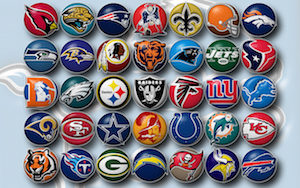
NFL Teams
*Black contributions to professional American football are many. We show a lengthy legacy directly reflecting United States society through the NFL on this date.
Pro Football, or the National Football League, originated in 1869 from a combination of rugby and soccer. During the early years, blacks were banned from the NFL. The first known Black man to play pro football was Charles Follis, with the Shelby Athletic Club in 1902. When Follis retired from professional football in 1906, he was replaced by Charles "Doc" Baker, the second Black pro football player. Baker played two years as a running back with the Akron Indians.
In 1911, another Black man, Henry McDonald, began a six-year career as a running back with the Rochester Jeffersons. The beginning of sport's first governing organization, the American Professional Football Association (APFA), began in 1919 and was replaced three years later by the National Football League. Both leagues signed black players. Robert "Rube" Marshall played tight end for the Rock Island Independents from 1919 to 1921, and Frederick "Fritz" Pollard had three years of action with the Akron Pros. Pollard became the first Black professional head coach when Akron signed him in 1920. He coached at Milwaukee (1922), Hammond (1923-1924), and Akron in 1925-1926.
Other African Americans who entered professional football throughout the 1920s were Paul Robeson, Jay "Inky" Williams, John Shelbourne, James Turner, Edward "Sol" Butler, Dick Hudson, Harold Bradley, David Myers, Joe Lillard, and Duke Slater. They all excelled for teams in the APFA and the NFL. In 1933, after 31 years of limited integration, the NFL banned black athletes from participating in league play. When the NFL was reintegrated in 1946, black players made an immediate impact, leading their teams in rushing, passing, and receiving.
The Los Angeles Rams became the first NFL team to integrate when they hired Black veterans Kenny Washington and Woody Strode the same year. The New York Giants (Emlen Tunnell) and the Detroit Lions were the only other NFL teams to welcome Black players during the 1940s, and more NFL teams recruited Black players in the 1950s. Several NFL teams stood out for their racist beliefs, including the Washington Redskins, the last professional football team to integrate, signing Bobby Mitchell in 1962. By the 1970s, blacks were among the NFL's top stars. In the late 1980s, Black players made gains in positions from which they had been discouraged, particularly as quarterbacks.
Among Blacks to play quarterback in the NFL were Willie Thrower, the first black quarterback in the league (1953), James Harris, Marlin Brisco, and Doug Williams, the only Black quarterback to lead his team to a Super Bowl win. Although blacks have excelled in football, they have not been welcomed in management positions. While 67 percent of all players in the NFL are Black, there are no Black owners, and there was one general manager. Ozzie Newsome became an NFL team's first black General Manager in 2002. He runs the front office for the Baltimore Ravens. Floyd Reese is currently in the same position with the New Your Giants, who won the Super Bowl in 2009 and 2011, and Houston's Rick Smith is the third.
In Management positions, the late Gene Upshaw was among the few early Blacks to lead the National Football League Player's Association. Art Shell became the first black head coach in the NFL and the second in professional football history when the Los Angeles Raiders hired him in 1989. Ten years later, head coach Ray Rhodes and his assistants with the Green Bay Packers became the first all-black staff in the NFL. By 1997, there were 103 black assistants. Today, even more assistants are Black, and more are coordinators compared to 1997.
In 2002, Nigerian Benet Omalu discovered evidence of Chronic Traumatic Encephalopathy (CTE). He published his findings in the journal Neurosurgery in 2005 in a paper entitled "Chronic Traumatic Encephalopathy in a National Football League Player." In 2016, the NFL's senior vice president for health and safety policy, Jeff Miller, testified before Congress that the NFL now believed there was a link between football and CTE.
In 2018, two years after Colin Kaepernick first knelt during the national anthem and one year after the creation of the NFL-Players Coalition social justice platform, some of the projects and programs all 32 teams have put in place. They include visiting at-risk schools and community centers and mentoring.
The number of non-white head coaches is down to four: Mike Tomlin of the Pittsburgh Steelers, Miami's multiracial Mike McDaniel, Todd Bowles (Tampa Bay Buccaneers), and DeMeco Ryans (Houston Texans). The New York Jets hired Robert Saleh, the son of Lebanese immigrants and the first NFL head coach known to be Muslim.
Miami's multiracial Mike McDaniel joins Pittsburgh's Mike Tomlin, Todd Bowles (Tampa Bay Buccaneers), and Houston's DeMeco Ryans as the league's only non-white head coaches. This is down from a record eight in 2018. In a sport where about 70% of the players are non-whites, the lack of diversity among the head-coaching ranks sticks out. On July 7, 2022, Sandra Douglass Morgan became the first black woman president in the NFL with the Las Vegas Raiders.
Pro Football Hall of Fame
2121 George Halas Drive NW
Canton, Ohio 44708
(330) 456-8207
OUTSIDE THE PALE:
The Exclusion of Blacks from the National Football League, 1934-1946
By Thomas G. Smith, Professor of History, Nichols College
The Coffin Corner Volume XI
Originally publisher, The Journal of Sport History